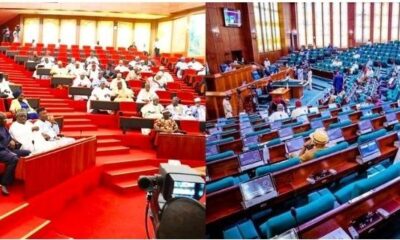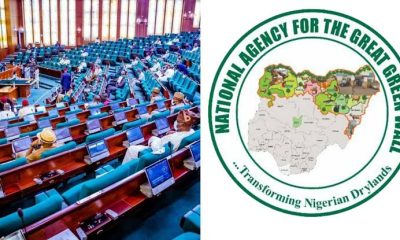News
FCC commissioner rebuffs Chairman’s letter for not appearing before Reps probe panel

Mr Moses Anaughe, Federal Commissioner, Federal Character Commission (FCC), representing Delta has countered its chairman, Mrs Farida Dankaka’s letter, stating why she could not appear before the House of Representatives probe panel on employment racketeering.
Dankaka in a letter she wrote to the ad hoc committee investigating Federal Ministries, Department and Agencies (MDAs), and Tertiary Institutions on the mismanagement of personnel recruitment in Abuja claimed she was scheduled to see her Doctor.
The ad hoc Committee is also investigating employment racketeering and gross mismanagement of IPPIS.
The letter was read by the Commissioner, representing, Taraba, stating that she had a medical appointment with her Doctor.
But in a swift reaction to the letter, Anaughe said the Chairman, was in the office as at the time of reading the letter of her purported ill-health.
“Distinguished honourable members, I want to inform this House that the FCC Chairman as we speak is in her office, this has been her usual way of dodging committee invitation.
” I just want you people to know, as we speak right now if you send somebody there now may be they will call her or send her a message she will run.
“This has been her usual practice because if FCC has done very well this issue of inviting other commission and agency will not arise because the bulk of this investigation lie on FCC, I just want this committee to know.
“And if I may request, she is in her office as we speak, she knows the duration of this committee that is why she is asking for a one week extension, I just want this honourable house to get this information.
“And I want to stress that this is the usual character of Dankaka, the chairman, FCC of abstaining from every committee that invited her.
“If she wants to collect 10 per cent of employment from any chief executive officer of MDAs, she will insist that the such chief executive must meet such person one on one, so why is she not here,” he queried.
He pleaded with the committee to ensure that Dankaka appeared before the it to explain her stewardship for three years she had been in the saddled.
Angered by the information, the chairman of the Committee, Rep Yusuf Gagdi dared the FCC Chairman to test the will of the committee, adding that the aftermath of her refusal to appear before the committee would not be pleasant.
He ordered Dankaka to appear before the committee with the entire commissioners by 12 p. m on July 26, describing the commissioners as liars.
Not satisfied with the name calling, Mr Tonye Okio, FCC, commissioner, representing Bayelsa said, “I take exceptions to you calling us liars.
There is a document from our chairman and she signed stating that she had an appointment with her Doctor today.
The committee however recommended that the Department of State Security should provide every investigation linked to the chairman of FCC
The committee also resolved that the president should saction any heads of MDAs that are taking tax payers money for granted.
Reacting to the development Anaughe said, ” As soon as I made that information, somebody among us called her, she left the office immediately and what I am saying now, MTN can proof that where she was when I made the statement.
“I want to tell this committee that all commisonera in FCC are in Abuja and we are ready to come before this committee tomorrow, ” he said.
Anaughe’s disclosure is against the backdrop of information provided by one of the commissioner supporting the chairman that some commisonera were outside Abuja.
Mr AbdulRasaq Abioye, FCC, Commissioner, representing Osun however said as at 12 p.m when he left the office, the chairman was still at the office.
Gagdi however sad that no matter where any commisonera were, they must be present by 11 a. m at the investigative hearing including the chairman of FCC.
News
Woman killed while crossing road in Anambra

The Federal Road Safety Corps (FRSC), Anambra State Sector Command, has confirmed the death of a woman in an accident at Okpoko Market on the Asaba-Onitsha Road.
The Sector Commander, Mr Adeoye Irelewuyi, who confirmed the accident to journalists in Awka on Thursday, said that the woman was hit while she was crossing the road.
He said that the accident, which occurred on Wednesday, involved a commercial tow truck with registration number XA550BMA.
“Eyewitness report reaching us indicates that the truck was towing a vehicle in an uncontrollable speed along the axis.
“The vehicle that was being towed got detached from the tow truck.
“It hit and killed a female adult, who was said to be crossing the road, while the tow truck continued its movement.
“FRSC rescue team came to the scene and took the woman to Toronto Hospital, Onitsha, where she was confirmed dead and her body deposited at the hospital’s mortuary,” he said.
While sympathising with the family of the dead, the sector commander urged motorists, especially tow truck drivers, to exercise a high level of professionalism.
He also urged the drivers to always use standard equipment and avoid speeding.
News
LASG’s maize palliative impactful, says poultry association chair

The Chairman, Poultry Association of Nigeria (PAN), Lagos State Chapter, Mr Mojeed Iyiola, said the state government’s maize palliative to members of the association made a positive impact on the sector.
Iyiola said this in an interview with the News Agency of Nigeria (NAN) on Thursday in Lagos.
“We received about 150,000 tons of maize in February from the Lagos State government as palliative to cushion the effect of high feed prices.
“The major benefit of the palliative is that it actually cushioned the cost of production for most poultry farmers in the state.
“The palliative was beneficial as it made the cost of some poultry produce, especially eggs to drop,” Iyiola said.
He noted that prior to the palliative, a crate of egg was sold between N3,500 and N3,700 at the farm gate, but after the palliative, it now sells between N3,200 and N3,400.
According to the PAN chair, retailers and middlemen who sell from N3,800 to N4,200 do that for their personal gain.
“We have urged our members to sell their eggs at reasonable prices following the receipt of the palliative from the government.
“We appreciate the Lagos State government for the palliative but we also urge the federal government to do likewise, to further reduce the cost of production in the sector.
“This will consequently lead to drop in the prices of all poultry produce across board,” he said.
He said the palliative was shared among financial members of the association at no extra cost.
“As an association we shared the grains equally across PAN’s eight zones in the state equally. We also mandated each zone not the sell even a grain of the maize.
“We, however, considered new poultry farmers who wanted to the join the association as beneficiaries of the palliative,” said Iyiola.
He noted that through the palliative, more poultry farmers were recruited into the association.
“The maize was shared only to poultry farmers and not feed millers, it is the major component of poultry feed formulation,” he said.
















